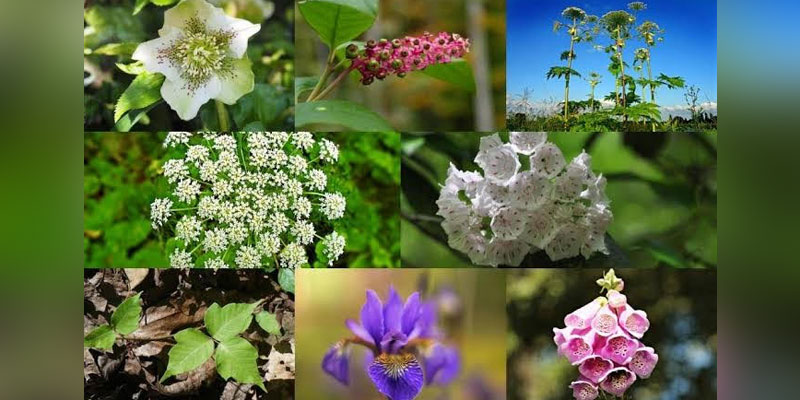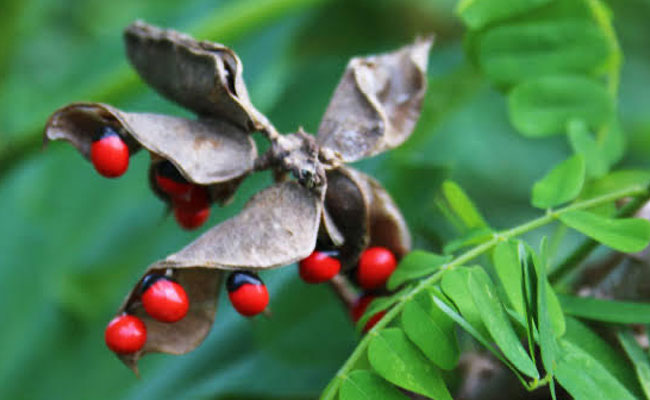Top 10 Most Poisonous Plants
Plants are a great addition to any home and garden. The abundance of beautiful and well-grown houseplants gives a special feeling of comfort at home. In addition to pleasing the eye, some houseplants have the ability to purify air quality. But did you know all plants in your garden are completely safe? Many pose a very serious potential threat to humans and animals. Given below is the list of most deadly plants: Read on!

1. Jimsonweed:
With its spiky fruits and leaves, jimsonweed has really carved a scary image for itself. This plant has long been associated with spiritual and magic properties because of its hallucinogenic properties. Believed to have originated from the Americas, it is now found worldwide and has medicinal properties such as relieving asthma symptoms and as an analgesic during surgery or bone-setting.

2. Castor Oil Plant:
This plant is an indispensable home remedy and is incredibly beautiful. However, the poisonous seeds of this flower contain ricin, perhaps the most toxic natural substance we've ever heard of. Just one tiny seed can kill a child after internal bleeding and severe dehydration due to diarrhea and vomiting. Fortunately, a fatal outcome is really rare. In some cases, it is possible to experience an allergic reaction to seed dust.

3. Aconite:
Aconite is also known as Monkshood, Wolf Bane and Leopard Bane.The ancient Greeks used its venom to kill leopards and wolves and it is called the wolf's curse. The aconite plant stands up to 6 feet in height. The large blue, purple and white mixed flowers are very attractive. The flowers of aconite resemble monastic heads. Accidental ingestion of aconite causes burning, vomiting and diarrhea. It also causes changes in blood pressure, heart irregularities and coma.

4. Foxgloves:
Foxgloves are either biennial or perennial flowers that grow tall and are great for adding height to your garden. Foxglove flowers, stems and roots are poisonous to both people and pets. Many people who eat this plant will have a bad stomach, breathing problems and may face cardiac abnormalities.

5. Water hemlock:
These tiny white flowers can show up as weeds in your garden, and you should remove them if you have curious pets. The venom of white hemlock attacks the nervous system, and can cause serious harm to animals and humans.

6. Roseary Peas:
The plant is known by many names, such as crab eye or indian licorice. It is native to India and is invasive, taking root in many countries around the world. Symptoms are similar to those of ricin but much more concentrated. This can lead to liver failure and eventually death over several days. The seeds have been used in jewelry and can cause painful death if consumed.

7. Lily of the valley:
Lily of the valley, also known as Convallaria majlis, is a woodland plant that is valued for its decadent scent in the summer months. This plant is known for its ability to cover the ground and thrives in moist and shady conditions. Consuming toxic compounds known as cardiac glycosides from this plant can cause a number of terrible reactions, including dizziness, vomiting, rashes and diarrhea. If left untreated, these symptoms can escalate and prove fatal. It is known for many medicinal properties. If you wish to buy medicinal plants online, there are plenty of them.

8. Poison ivy:
It is a vine plant, which means it climbs trees, homes, and walls, and can grow up to 100 feet tall. Even though its name sounds alarming, it is usually only slightly poisonous. If pets come into contact with the plant (through touch or ingestion), irritation and rashes are observed. If you are traveling through wild places, make sure you have protective clothing on your skin.

9. Oleander:
Oleander, or Nerium oleander, is considered by many to be the most poisonous plants in the world. Two of the most powerful are oleandrin and nerin, which are known for their powerful effects on the heart. The venom of an oleander is in fact so strong that it can poison a person who eats honey made by bees that digest oleander nectar.

10. Deadly Nightshade:
Probably the plant with the most feared namesake, deadly nightshade, grows to a height of 1.5 meters and can be recognized by its dull, dark green leaves and bell-shaped purple flowers. Sweet and juicy fruits make them attractive to children. Although it is rarely found in wild areas, it is restricted to cultivation. It is one of the very few plants that is deadly to humans but completely safe for animals and birds. Deadly venom attacks the nervous system, providing nerve endings in involuntary muscle paralysis.
Though you can easily find these plants on any Online Plant Nursery. All you need is to visit online and order. But be aware.















